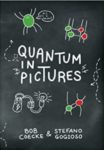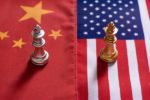Silicon photonics has the potential to transform HPC: it’s a dual-threat interconnect technology that could – if and when it is wrestled into commercial, cost-effective form – move data within chips and systems much faster than conventional, copper-based interconnects while also delivering far greater energy efficiency. Venture-backed start-ups and established tech companies….
@HPCpodcast: Silicon Photonics – Columbia Prof. Keren Bergman on the Why, How and When of a Technology that Could Transform HPC
@HPCpodcast: Ukraine’s Frontline Software Soldiers; the UK’s Exascale Strategy; House Hearing on Global Tech Leadership; Intel’s Revised Roadmap
Soon after the one-year observance (Feb. 24) of Russia’s invasion of Ukraine, the Wall Street Journal ran an article by Shyam Sankar, CTO at big data and machine learning company Palantir, on the vital role of Ukrainian software engineers cum front line soldiers in the country’s war effort. It’s a remarkable story of technology entrepreneurship brought to the battlefield, one that helps explain how Ukraine, a country with less than 25 percent the population of Russia, has successfully pushed the invaders back from their early territorial gains. Sankar’s article compelled Shahin and Doug to reflect on the new type of war Ukraine is waging….
@HPCpodcast: The AI Gold Rush, Virtual Quantum, an Advance for Silicon Photonics and Nuclear Energy for Future Supercomputers
In what may become a regular segment of the @HPCpodcast, Shahin and Doug cover important recent developments in HPC and AI that signal changes in markets and policies. Always, we keep an eye on where these developments fit into the big picture, what it all means. This time, we look at what may be AI’s “iPhone moment” (you guessed it: ChatGPT) and the ensuing AI gold rush that’s been gaining massive investment momentum since about 2015, much to the happiness of NVIDIA shareholders; virtual quantum computers; and how advances in silicon photonics could change the chip – and therefore the technology – industry….
Let’s Talk Exascale: ALCF’s Katherine Riley Talks Aurora Deployment, Impactful Science and Partnering with ECP
In this episode of the “Let’s Talk Exascale” podcast, the Exascale Computing Project’s (ECP) Scott Gibson talks with Katherine Riley, director of science at the Argonne Leadership Computing Facility. Her mission is to lead a team of ALCF computational science experts who work with facility users to maximize their use of the facility’s computing resources. […]
@HPCpodcast: ‘Quantum in Pictures’ Author Bob Coecke
The HPC community is a very intelligent bunch, as a rule, but a few segments of the industry call for an exceptional, Himalayan level of smarts. One of them is quantum. Conversing – or trying to converse – with a quantum computing specialist is for most of us a withering and futile experience from which we emerge feeling strangely reduced. Quantum people speak a language we don’t know and play a sport we’ve never seen, yet we very much want to understand both. Quantum could change the world. But how? Into this opaque arena comes Bob Coecke, chief scientist at quantum company Quantinuum, who is co-author with Stefano Gogioso of the recently-released Quantum in Pictures: A New Way to Understand the Quantum World, which is intended to make quantum more accessible.
@HPCpodcast: IBM’s AI Supercomputer, Quantum in the News and Google’s Bard vs. Bing’s ChatGPT
In our latest @HPCpodcast episode, Shahin and Doug discuss the latest HPC industry news, including several quantum computing developments, Google’s “Bard” generative AI response to the Chat GPT phenomenon, IBM’s “Vela” cloud-native AI supercomputer (powered by Intel Cascade Lake CPUs and NVIDIA A100 GPUs – and a general discuss of IBM’s evolved position in the HPC-AI industry.
@HPCpodcast: On ‘Myths and Legends of HPC’ with the RIKEN Center’s Satoshi Matsuoka and Torsten Hoefler, ETH Zurich
There are so many great tech ideas, but how do you assess which ones will impact HPC? How do we filter out hype? In a new, future looking paper entitled “Myths and Legends in High-Performance Computing,” Satoshi Matsuoka, Jens Domke, Mohamed Wahib, Aleksandr Drozd, and Torsten Hoefler tackle 12 important topics, from major technology areas to specific capabilities and applications in HPC systems to come. In this episode, we talk with Satoshi and Torsten (one of them in an airport) about their paper, which helps formulate the right questions and initiates important discussion points by posing the topics as myths and legends in an enjoyable and humorous paper.
@HPCpodcast: Who’s Winning the High-Stakes U.S-China AI Race?
If you’re concerned about the advanced chip competition between the U.S. and China – and who isn’t? – then this week’s @HPCpodcast guest offers much food for thought. Handel Jones, founder and CEO of the International Business Strategies consulting firm, is the author of a new book, WHEN AI RULES THE WORLD: China, The U.S., And The Race To Control A Smart Planet. He contends that China is winning the AI race in part because the leadership of the PRC regime is more competent and technically astute than some in the West may think.
@HPCpodcast: Our Favorite 2023 Predictions, Puncturing the Myths of HPC and New Advanced Chips
In our opening episode of 2023, Shahin and Doug discuss the recent chip announcements from Intel and AMD and their implications for HPC. We also talk about are industry predictions for the year to come featured in this article on insideHPC — including the ones we think most interesting. We also discuss a recent paper from researchers in Japan and Europe — led by Satoshi Matsuoka of the RIKEN Center for Computation Science — on the 12 myths and legends of HPC, a buffet for thought.
@HPCpodcast Special Edition: 2022 in Review and What’s Ahead in 2023 for HPC
In this year-in-review double-issue episode of @HPCpodcast, Shahin and Doug continue what is becoming a tradition, a discussion of some of the notable developments, trends and news stories of the past year in HPC, including : HPC market growth, the U.S.-China supercomputing competition and trade war, the official arrival of exascale-class supercomputing, quantum computing, SC22, artificial intelligence (including “sentient AI”) and machine learning, Jack Dongarra’s ACM Turing Award, the criticality of emerging interconnect technologies, the defunct Nvidia-Arm deal, the CHIPS & Science Act and the push for domestic chip production in the U.S., HPC software and fusion energy.











